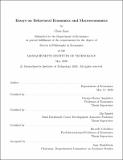Essays on behavioral economics and macroeconomics
Author(s)
Lian, Chen,Ph. D.Massachusetts Institute of Technology.
Download1193029164-MIT.pdf (1.620Mb)
Other Contributors
Massachusetts Institute of Technology. Department of Economics.
Advisor
George-Marios Angeletos, Alp Simsek, and Ricardo Caballero.
Terms of use
Metadata
Show full item recordAbstract
This thesis consists of three chapters in behavioral economics and macroeconomics. In the first chapter, I develop an approach, which I term narrow thinking, to break the decision maker's ability to perfectly coordinate her multiple decisions. For a narrow thinker, different decisions are based on different, non-nested, information. I recast this individual decision problem as multiple selves playing an incomplete-information game. The narrow thinker then makes each decision with imperfect knowledge of the other decisions. The friction effectively attenuates the interaction across decisions. Narrow thinking then provides a model of narrow bracketing without directly imposing that each decision is made in isolation. The main application is that narrow thinking generates smooth mental accounting, without requiring the decision maker to have explicit budgets. My approach also leads to unique predictions about what drives the degree of mental accounting behavior. Depending on the environment, narrow thinking can translate into either over- or under-reaction relative to the frictionless benchmark. In the second chapter, I am motivated by the fact that consumers have difficulty tracking their total wealth, or keeping it at the front of their minds when making consumption and saving decisions. In this chapter, I show how such imperfect perception of wealth can explain several key deviations of consumption behavior from the permanent income hypothesis, including: excess sensitivity to current income, smaller MPCs out of wealth than out of current income, and excess discounting of future income. Importantly, my approach does not rely on liquidity constraints and can explain the empirical evidence on high-liquidity consumers' deviations from the permanent income hypothesis. I further provide an interpretation of the model in which the consumer has separate mental accounts for her current income and her wealth. Thus, the consumer exhibits behavior similar to a two-asset model, in a one-asset context without borrowing constraints. The friction can be quantitatively important in explaining MPCs, and has substantive macro implications for monetary and redistributive policy. Methodologically, the paper develops a tractable method for incorporating imperfect perception of the endogenous state into an otherwise standard Markov decision problem. In the third chapter (joint with George-Marios Angeletos), we turn to the classic macroeconomics question about how the economy responds to news about future policies or future fundamentals. Standard practice assumes that agents have common knowledge of such news and face no uncertainty about how others will respond. Relaxing this assumption attenuates the general-equilibrium effects of news and rationalizes a form of myopia at the aggregate level. We establish these insights within a class of games which nests, but is not limited to, the New Keynesian model. Our results help resolve the forward-guidance puzzle, offer a rationale for the front-loading of fiscal stimuli, and illustrate more broadly the fragility of predictions that rest on long series of forward-looking feedback loops. JEL Codes D90, E50, E90.
Description
Thesis: Ph. D., Massachusetts Institute of Technology, Department of Economics, May, 2020 Cataloged from the official PDF of thesis. Includes bibliographical references (pages 289-302).
Date issued
2020Department
Massachusetts Institute of Technology. Department of EconomicsPublisher
Massachusetts Institute of Technology
Keywords
Economics.